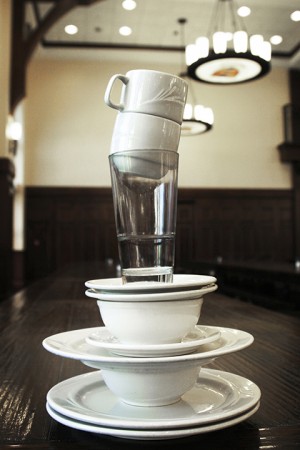
By Jordan Corona
Staff Writer
There’s a gravy-soaked cookie riding a greasy plate down the conveyor belt to the kitchen sink at a cafeteria somewhere. No doubt, you’ve probably seen it around campus.
While the green and gold has felt pressure to go green with in the last decade, the question for sustainable operations, particularly when it comes to food service, finds a home at the south end of a ledger. Sustainability is about dollars, not necessarily sense.
Food is important for staying healthy and maintaining social interaction, and the dining halls play a special part in that around campus. But for as much good campus dining does for the institution, for the students, food is a bad buy for the university when it gets wasted. University Dining Services are a coordinated effort between the school and an industrial food corporation, Aramark.
James Wharton, senior food services director for waste management, said wasted food is costly. That’s part of the reason the university’s contracted food provider, Aramark, revised a few policies to cut down on wasted food at its cafeterias. “With the new management of food waste, there was an effort to reduce costs and adhere to new recipes,” Wharton said. “With the new corporate program, we’re better able to adjust to what students will use.”
But there are different parameters to thinking about what to do with food parts that no one will eat. Lemon peels, for example, are not exactly wasted food as no one plans to eat them. What students will or will no use is, by and large, an unmitigated gap in the Dining Services’ efforts to curtail irresponsible food production.
Jessica Woods, dining services marketing director, said that’s why dining hall staff pay such special attention to the portion sizes they distribute. There’s a rule in effect to serve as many people as possible, with a reasonable amount of food.
Retail dining in the Bill Daniel Student Center began collecting food scraps into five-gallon buckets and recording weight a number of years ago said Smith Getterman, assistant director of sustainability and special projects.
He said collecting scraps was part of the Aramark’s mandate in order to reduce food waste across the board. Campus dining halls use the same practice to estimate how much food to prepare.
The Campus Kitchen, a nonprofit student organization, collects dining hall leftovers and repurposes them to feed folks who are hungry in the community.
Though University Dining Services did not release its food waste numbers, Campus Kitchen reported receiving just over 5,000 pounds of donated foodstuffs since fall 2013. But health and safety regulations determine what they can take and how much, leaving unaccounted sum of wasted food for the trashcans out back.
Food waste that’s not repurposed ends up in the pulper, a machine for grinding organic matter so it takes up less space in the trash bins outside the cafeterias.
As it stands, corporate policies equip Dining Services to retroactively account for and anticipate how much food students and faculty will eat.
“All-you-care-to-eat” block meal plans give a purchaser access to unlimited meals. The problem, at least as waste management see it, is that campus dining patrons often don’t care to eat what they’ve selected.
For just over $2,000 a year, one may purchase a set of meals with absolutely no stipulations on serving sizes or refunding for meals that remain unused by the end of the semester.
“They’re also thinking about the transitional stage of life many students are in,” Woods said. “Campus dining can help remove the stress of having to feed themselves.”






